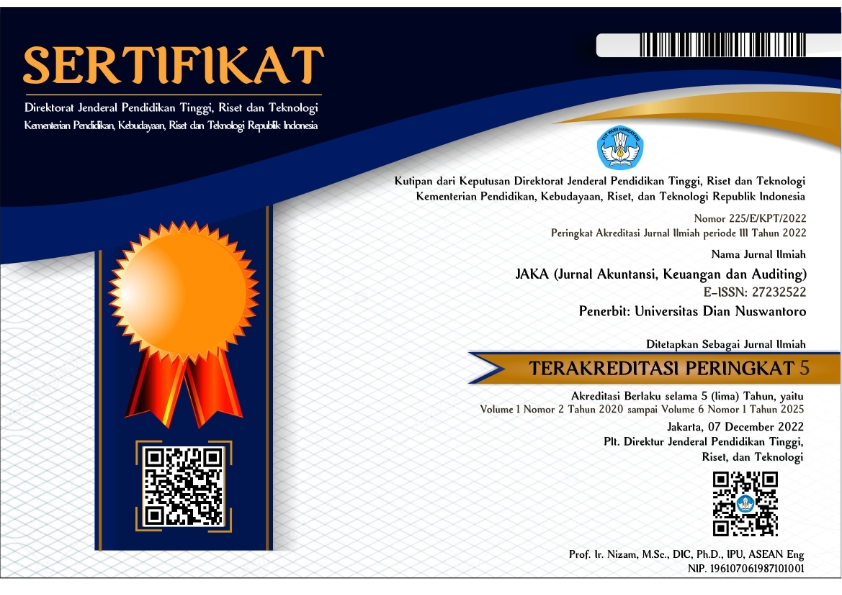Differences Between Internal And External Audits In Detecting Fraud: The Moderating Role Of Professional Skepticism As A Moderating Variabel
DOI:
https://doi.org/10.56696/jaka.v5i1.11045Keywords:
professional independence, auditor page, professional skepticism, fraud detectionAbstract
This research aims to examine the differences between internal and external audit in detecting fraud, as well as the role of professional skepticism as a moderating variable between independence and audit experience in fraud detection. The population and research object are internal and external auditors in Central Java Province. The sampling technique used in the research was purposive sampling, obtaining a sample of 155 internal auditors and 177 external auditors. The research method uses Structural Equation Model (SEM) with the help of Smart-PLS 4 software. Data was obtained using a questionnaire. The research results were divided into two groups, namely in the internal and external auditor groups, where there were similar results which stated that professional independence and auditor experience had a positive impact on fraud detection. The moderating variable professional skepticism is unable to moderate the relationship between professional independence and auditor experience in detecting external and internal auditor fraud. However, in the professional internal auditor group, skepticism was able to moderate the relationship between auditor experience and fraud detection.References
Agustina, F., Nurkholis, N., & Rusydi, M. (2021). Auditors’ professional skepticism and fraud detection. International Journal of Research in Business and Social Science (2147- 4478), 10(4), 275–287. https://doi.org/10.20525/ijrbs.v10i4.1214
AMBARSARI, D., PRATOMO, D., & KURNIA, K. (2018). Pengaruh Ukuran Dewan Komisaris, Gender Diversity pada Dewan, dan Kualitas Auditor Eksternal terhadap Agresivitas Pajak (Studi pada Perusahaan Sektor Property dan Real Estate yang Terdaftar di Bursa Efek Indonesia Periode 2013-2017). Jurnal ASET (Akuntansi Riset), 10(2), 163–176. https://doi.org/10.17509/jaset.v10i2.14991
Anto, L. O., Hamid, W., Florensia, A., & Supyati, O. (2020). Auditor’s Ability To Detect Fraud: Independence, Audit Experience, Professional Skepticism, And Work Load. Russian Journal of Agricultural and Socio-Economic Sciences, 107(11), 192–205. https://doi.org/10.18551/rjoas.2020-11.23
Association of Certified Fraud Examiners Indonesia. (2019). Survei Fraud Indonesia 2019. In Indonesia Chapter #111 (Vol. 53, Issue 9). https://acfe-indonesia.or.id/survei-fraud-indonesia/
Budiantoro, H., Nurrahmah, M., & Lapae, K. (2022). Pengaruh Beban Kerja, Skeptisme Profesional, dan Pengalaman Auditor dalam Mendeteksi Kecurangan dengan Pelatihan Audit Kecurangan sebagai Variabel Moderasi. Journal of Business and Economics Research (JBE), 3(3), 342–349. https://doi.org/10.47065/jbe.v3i3.2330
Fauziah, K., & Yanthi, M. Y. (2021). Pengaruh Fee Audit, Independensi, Pengalaman Auditor Dan Kompetensi Auditor Terhadap Kualitas Audit (Studi Kasus Kap Di Jawa Timur). Jae (Jurnal Akuntansi Dan Ekonomi), 6(2), 61–70. https://doi.org/10.29407/jae.v6i2.15992
Hair, J. F. J., Sarstedt, M., Hopkins, L., & G. Kuppelwieser, V. (2014). Partial least squares structural equation modeling (PLS-SEM). European Business Review, 26(2), 106–121. https://doi.org/10.1108/EBR-10-2013-0128
Hair, J. F., Risher, J. J., Sarstedt, M., & Ringle, C. M. (2019). When to use and how to report the results of PLS-SEM. European Business Review, 31(1), 2–24. https://doi.org/10.1108/EBR-11-2018-0203
Hakami, T. A., Rahmat, M. M., Yaacob, M. H., & Saleh, N. M. (2020). Fraud Detection Gap between Auditor and Fraud Detection Models: Evidence from Gulf Cooperation Council. Asian Journal of Accounting and Governance, 13, 1–13. https://doi.org/10.17576/ajag-2020-13-01
Handoyo, B. R. M., & Bunga, I. B. (2021). The influence of internal audit and internal control toward fraud prevention. International Journal of Financial, Accounting, and Management, 3(1), 45–64. https://doi.org/10.35912/ijfam.v3i1.181
Iftinan, S. H., & Sukarmanto, E. (2022). Pengaruh Pengalaman Auditor dan Kompetensi terhadap Pendeteksian Kecurangan Laporan Keuangan. Jurnal Riset Akuntansi, 2(1), 1–7. https://doi.org/10.29313/jra.v2i1.666
Iskandar, I. S., & Kurniawan, T. (2020). Gratifikasi di Badan Usaha Milik Negara Berdasarkan Motif Kecurangan: Sebuah Tinjauan Literatur. JIIP: Jurnal Ilmiah Ilmu Pemerintahan, 5(2), 81–97. https://doi.org/10.14710/jiip.v5i2.7690
Junitra, R., & Lastanti, H. S. (2022). Pengaruh Independensi, Kompetensi Dan Tekanan Waktu Terhadap Kualitas Audit Dengan Skeptisme Profesional Sebagai Pemoderasi. Jurnal Ekonomi Trisakti, 2(2), 1551–1560. https://doi.org/10.25105/jet.v2i2.15017
Kartim, S., Ibrahim, M. B. H., Akbar, M. A., Kartim, & Sutisman, E. (2022). Independence and Competence on Audit Fraud Detection: Role of Professional Skepticism as Moderating. Jurnal Akuntansi, 26(1), 161. https://doi.org/10.24912/ja.v26i1.823
Khan, G. F., Sarstedt, M., Shiau, W.-L., Hair, J. F., Ringle, C. M., & Fritze, M. P. (2019). Methodological research on partial least squares structural equation modeling (PLS-SEM). Internet Research, 29(3), 407–429. https://doi.org/10.1108/IntR-12-2017-0509
Klienman, G., Strickland, P., & Anandarajan, A. (2020). Why Do Auditors Fail to Identify Fraud? An Exploration. Journal of Forensic and Investigative Accounting, 12(2), 334–351.
Koerniawati, D. (2021). the Remote and Agile Auditing: a Fraud Prevention Effort To Navigate the Audit Process in the Covid-19 Pandemic. Jurnal Riset Akuntansi Dan Bisnis Airlangga, 6(2), 1131–1149. https://doi.org/10.20473/jraba.v6i2.208
Larasati, D., & Puspitasari, W. (2019). Pengaruh Pengalaman, Independensi, Skeptisisme Profesional Auditor, Penerapan Etika, Dan Beban Kerja Terhadap Kemampuan Auditor Dalam Mendeteksi Kecurangan. Jurnal Akuntansi Trisakti, 6(1), 31–42. https://doi.org/10.25105/jat.v6i1.4845
Lari Dashtbayaz, M., Salehi, M., & Hedayatzadeh, M. (2022). Comparative analysis of the relationship between internal control weakness and different types of auditor opinions in fraudulent and non-fraudulent firms. Journal of Financial Crime, 29(1), 325–341. https://doi.org/10.1108/JFC-01-2021-0005
Mariyana, A. B., Simorangkir, P., & Putra, A. M. (2021). Pengaruh Pengalaman Auditor, Independensi dan Beban Kerja Terhadap Kemampuan Auditor Mendeteksi Fraud. Prosiding Biema, 2, 766–780.
Merta Permana, I. M. B. A., & Budiartha, I. K. (2022). Pengaruh Pengalaman Audit, Skeptisme, Intuisi, Dan Independensi Auditor Terhadap Kemampuan Auditor Mendeteksi Kecurangan. E-Jurnal Ekonomi Dan Bisnis Universitas Udayana, 11(11), 1369. https://doi.org/10.24843/eeb.2022.v11.i11.p09
Muntasir, M., & Maryasih, L. (2021). Pengaruh Independensi, Pengalaman, Skeptisme Profesional Auditor Dan Kompetensi Terhadap Kemampuan Auditor Dalam Mendeteksi Kecurangan (Studi Pada Inspektorat Aceh). Akbis: Media Riset Akuntansi Dan Bisnis, 5(2), 138. https://doi.org/10.35308/akbis.v5i2.3946
Narayana, A. A. S. (2020). Auditors experience as moderating effect investigative abilities and understanding of red flags on fraud detection. International Research Journal of Management, IT and Social Sciences, 7(1), 205–216. https://doi.org/10.21744/irjmis.v7n1.837
Nurkholis, N. (2020). Pengaruh Pendidikan, Pelatihan, Dan Pengalaman Terhadap Skeptisisme Profesional Auditor. EKUITAS (Jurnal Ekonomi Dan Keuangan), 4(2), 246–265. https://doi.org/10.24034/j25485024.y2020.v4.i2.4376
Putra, G. S. A., & Dwirandra, A. A. N. B. (2019). The effect of auditor experience, type of personality and fraud auditing training on auditors ability in fraud detecting with professional skepticism as a mediation variable. International Research Journal of Management, IT and Social Sciences, 6(2), 31–43. https://doi.org/10.21744/irjmis.v6n2.604
Rahmi, M., Fitri, A., Putra, Y. E., Masdar, R., Marlin, K., Negeri, U. I., Yunus Batusangkar, M., Keuangan, A., Padang, P., Id, M. A., & Author, C. (2024). The Role Of Internal Auditor Independence And Whistleblowing Systems In Detecting Fraud: Literature Review Peran Independensi Auditor Internal Dan Whistleblowing System Dalam Mendeteksi Fraud: Literature Review. Management Studies and Entrepreneurship Journal, 5(1), 597–606. http://journal.yrpipku.com/index.php/msej
Ritonga, A. Y. (2023). Peran Audit Internal Dalam Penerapan Manajemen Risiko Perusahaan. Owner, 7(3), 2348–2357. https://doi.org/10.33395/owner.v7i3.1454
Roszkowska, P. (2021). Fintech in financial reporting and audit for fraud prevention and safeguarding equity investments. Journal of Accounting and Organizational Change, 17(2), 164–196. https://doi.org/10.1108/JAOC-09-2019-0098
Ruth, N., Takasenserang, A., & Indarto, S. L. (2021). Experience as Moderator for Factors Affecting Auditor’s Ability to Detect Fraud. Asian Journal of Law and Governance, 3(4), 12–20. https://doi.org/10.55057/ajlg.2021.3.4.2
Salsabil, A. (2020). Pengaruh Pengalaman Auditor, Independensi, Pendidikan Berkelanjutan, Tekanan Waktu Kerja Terhadap Pendeteksian Kecurangan Oleh Auditor Eksternal Dengan Skeptisisme Profesional Sebagai Variabel Moderasi. Prosiding Seminar Nasional Pakar, 1–7. https://doi.org/10.25105/pakar.v0i0.6907
Santoso, R. D., Budi Riharjo, I., & Kurnia, K. (2020). Independensi, Integritas, Serta Kompetensi Auditor Terhadap Kualitas Audit dengan Skeptisisme Profesional Sebagai Variabel Pemoderasi. Journal of Accounting Science, 4(2), 36–56. https://doi.org/10.21070/jas.v4i2.559
Sarstedt, M., Hair, J. F., Nitzl, C., Ringle, C. M., & Howard, M. C. (2020). Beyond a tandem analysis of SEM and PROCESS: Use of PLS-SEM for mediation analyses! International Journal of Market Research, 62(3), 288–299. https://doi.org/10.1177/1470785320915686
Sukma, E., & Paramitha, R. V. (2020). Pengaruh Pengalaman Auditor, Independensi, dan Keahlian Profesional Terhadap Kemampuan Auditor Mendeteksi Kecurangan Laporan Keuangan dengan Skeptisme Profesional sebagai Variabel Moderasi. Prosiding Seminar Nasional Pakar, 1–6. https://doi.org/10.25105/pakar.v0i0.6875
The Institute of Internal Auditors. (2019). Internal Audit dan Kecurangan. In IIA Position Paper. www.globaliia.org.
Downloads
Published
How to Cite
Issue
Section
License
Copyright (c) 2024 JAKA (Jurnal Akuntansi, Keuangan, dan Auditing)

This work is licensed under a Creative Commons Attribution-ShareAlike 4.0 International License.













